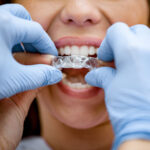Wisdom Teeth Removal & General Extractions
There are several reasons that one or more teeth may need to be extracted. While no one enjoys hearing that they need to have teeth extracted, you’ll find that the compassionate and gentle touch our dentists offer will help to make the process just a little bit easier for you.
Avoiding to remove unhealthy teeth can lead to many serious health issues. There is also the risk of seeing decay spread to previously healthy teeth.
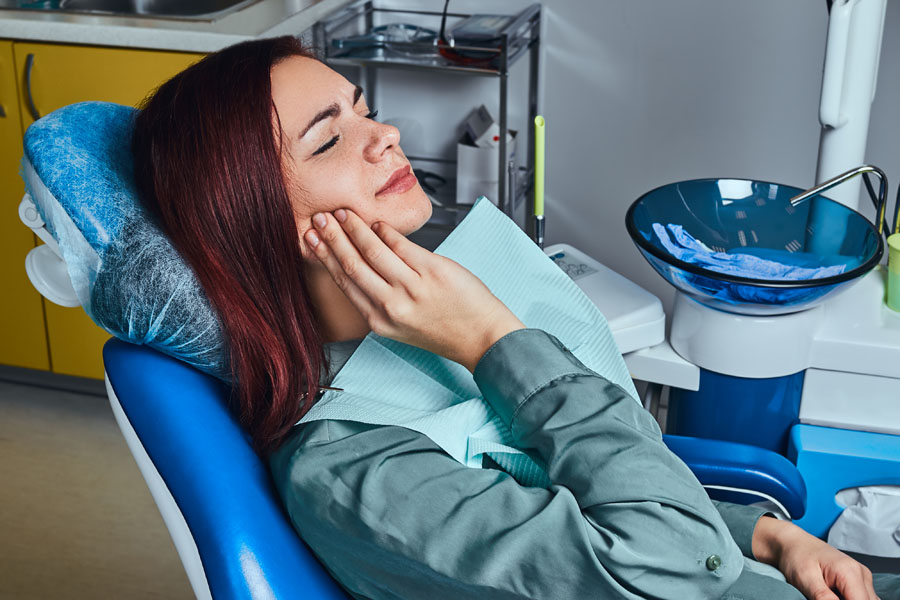

What is a dental extraction?
The extraction of a tooth involves the complete removal of the tooth from the jaw bone; it is also known as ‘Getting a tooth out’. Both the structure visible above the gum line and the hidden root structure is removed.
Once a tooth has been surgically removed, it cannot be reinserted into the gum. Tooth removal is a permanent dental procedure.
If a tooth has been damaged by decay or is broken, your dentist will restore it with fillings or crown perhaps. If there is too much damage to the tooth, then it may need to be removed from its socket. This may occur if the damage is too far below the gum or if decay removal would leave too little tooth left to fix.
Some of the reasons beyond damage and decay could include the following.
- The removal of impacted and infected wisdom teeth
- Removing extra teeth that are preventing new teeth from erupting
- Baby teeth may not fall out in time to allow the adult teeth to grow in
- Extensive damage to a tooth from an injury to the tooth
- Teeth removed for braces
Wisdom teeth are the last teeth to appear, from 16-18 years approximately. They appear at the back of the mouth. The majority of wisdom teeth don’t cause a problem even if they don’t fully fit into the mouth and are impacted. However, a minority of wisdom teeth will begin to become inflamed and become tender. This problem often keeps reoccurring and can even swap sides of the mouth. There are in general three reasons for taking out wisdom teeth
- Persistent pain and swelling
- Food packing causing a problem for the neighbouring healthy tooth
- Decay in the wisdom tooth itself
Taking out wisdom teeth to avoid crowding is no longer justified and wisdom teeth are felt to have a very small roll in the alignment of teeth
Persistently inflamed and infected wisdom teeth can lead to cysts around the impacted teeth, the deterioration of the jaw bone or surrounding teeth leading to further damage.
If the damage or decay on a tooth can be restored with a filling even if a root canal treatment is necessary, then this is considered to be the better option. Persistently infected wisdom teeth or teeth that need to be extracted in order to make space for orthodontic treatment will need to be removed.
Our dentists offer a focus on the preservation of the natural tooth. The removal of a tooth is considered to be the last option in order to preserve oral health.
Many patients are afraid of pain during the extraction process. There will be no pain felt during the procedure. Each member of our team places a high premium on ensuring patient comfort.
You will be placed under a local anaesthetic that will ensure you feel no discomfort or pain. You will be aware of the procedure and will be able to respond to the instructions that your dentist gives you, but you will feel little more than some pressure while the tooth is being extracted.
Specialised dental tools will be used for the extraction. If there is enough tooth structure above the gum, the tooth will be firmly gripped. The dentist will rock the tooth back and forth in an effort to widen the socket and loosen the roots. In routine cases, the tooth will be pulled cleanly from the socket.
If the tooth has been cracked or broken, or perhaps has curved roots, then it may prove to be necessary to break the tooth up and remove it in pieces. This may sound like it could be uncomfortable, but it is quite common and will not cause any additional pain or discomfort.
Once the tooth has been removed cleanly from the socket, the socket will be inspected. Any remaining pieces of the tooth will be removed. A piece of gauze will be placed over the socket, and pressure will be applied. If the extraction was routine and there was no need to cut the gum, then there will be no need for stitches.
You’ll be given a fresh piece of gauze to bite down on, to apply additional pressure to the socket. You will be provided with aftercare instructions to help you through the recovery phase at home.
Some patients start to feel discomfort as the anaesthetic starts to wear off. Your dentist will be sure to provide you with options for pain management. A prescription for antibiotics to help avoid the potential for an infection setting in is for the most part not required- your body usually reacts very well to the bad tooth being removed and heals uneventfully.
Any discomfort felt should ease off within a few days. Be sure to call your dentist right away if you feel sharp and sudden pain. The pain may be indicative of a painful condition that is known as dry socket which benefits from a dressing of the wound.
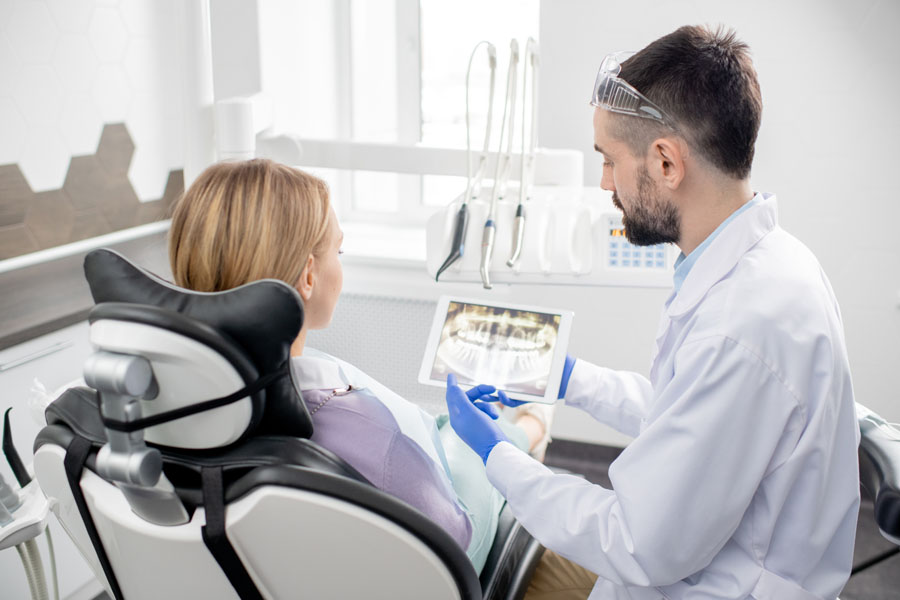
What does tooth extraction cost?
If you require a tooth extraction, you’ll find that our dentists offer the compassionate touch that will help to set your mind at ease during the procedure.
At Cork City Dentist we practise minimally invasive dentistry that will help to preserve teeth where possible. To learn more about tooth extractions and the associated costs, view our competitive pricing plan below and call the clinic to book your appointment.
| Treatment | Price |
|---|---|
| Periodontal therapy/treatment of gum disease per visit | €80 |
| Composite white/aesthetic fillings- regular | €100 |
| Composite white/aesthetic fillings -large | €120-€150 |
| Extractions – routine | €100 |
| Extractions – surgical | €150 |
| Small X-rays | €10 each |
| Root Canal Treatments - Incisor - (front) tooth | €400 |
| Root Canal Treatments - Molar - (back) tooth | €700 |
| Root Canal Treatments - Premolar - (side) tooth one root | €400+ |
| Root Canal Treatments - Premolar - (side) tooth two or more roots | €500+ |
Are you struggling with repeated infections in your wisdom teeth? Are your teeth damaged and cracked past the point of restoration?
Don’t put up with pain and sensitivity. Remember broken down teeth don’t improve with time! Call the clinic at 0214501306 , 0214501250 or book online to make your appointment.
Other Treatments you may consider

Dental Check-ups
Preventing small dental issues from flaring up into much more severe health problems is possible when you maintain a good check-up routine with our dentist. Both a check-up and consultation for additional dental services and treatments can help you to ensure proper oral health.
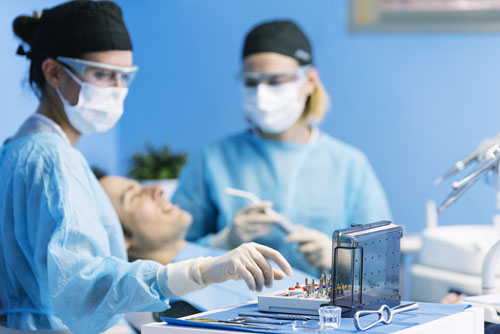
Dental Hygienist Visits
Preventing small dental issues from flaring up into much more severe health problems is possible when you maintain a good check-up routine with our dentist. Both a check-up and consultation for additional dental services and treatments can help you to ensure proper oral health.

Fissure Sealants
The molars in our mouth have chewing surfaces that may feel smooth but, in fact, have many natural fissures or grooves and pits. These fissures or grooves are where decay can often first be seen. Even with a healthy daily oral health care routine, some of these fissures cannot be cleaned well enough to keep the tooth decay-free.

Oral Cancer Screening
Early detection is of paramount importance in reducing mortality from oral cancer. Survival rates are above 80% if diagnosed early and below 30% later. Oral cancer, especially in men, is the 8th most common cancer worldwide. Most of the oral tumours develop in areas that can be seen or noticed by your dentist, so early detection is possible.
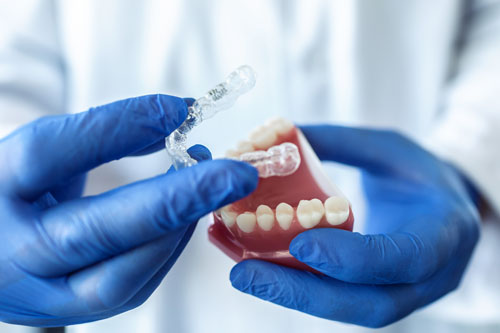
Gum Shields & Mouth Guards
Trauma to the teeth and mouth can result in lacerations and bleeding to the gums. It can also fracture or dislodge teeth. Whether as the result of an accidental strike directly to the mouth or due to a knock on the chin crashing your teeth together, impacts to the mouth can result in a variety of injuries, one more serious than the next.
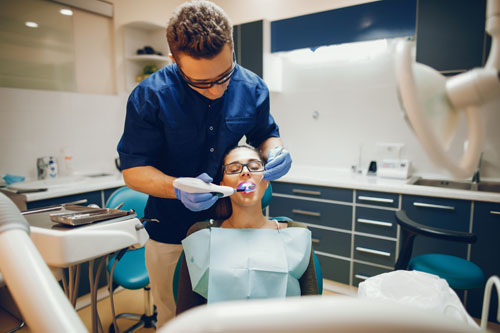
Root Canal Treatments
If your tooth has suffered an injury or perhaps you have severe decay in a tooth, you may require a root canal treatment. Early signs of permanent nerve damage may be a toothache coming on for no reason. Waking you from sleep and not responding to painkillers.
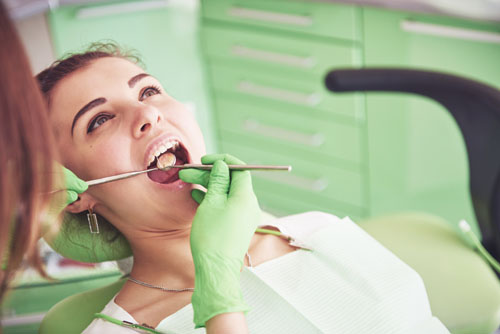
Tooth Fillings
A cavity is a small hole on a tooth that is the result of tooth decay. The sugar we eat and drink creates an acidic environment that allows the mineral to escape our tooth leaving a hole behind. If the cavity is not treated by a professional, you will be putting the tooth at risk of further decay and damage as the decay will continue inside the tooth unabated.
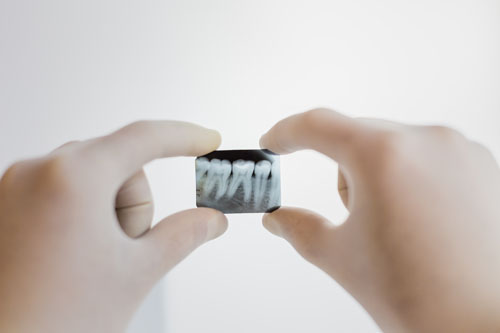
Wisdom Teeth Removal & General Extractions
There are several reasons that one or more teeth may need to be extracted. While no one enjoys hearing that they need to have teeth extracted, you’ll find that the compassionate and gentle touch our dentists offer will help to make the process just a little bit easier for you.
Frequently Asked Questions
There are two aspects to eating after you have had a dental extraction
- Trying not to disturb the healing site
- Trying to look after all the numb parts
Good healing requires the blood clot in your socket to gradually change into your new gum. The main aim of your eating, drinking and cleaning efforts after your extraction is to keep the clot undisturbed. It, therefore, makes sense to eat softer food making some effort to keep the food on the other side of your mouth even though that’s difficult. Food that requires a lot of work to eat and chew risks damaging the blood clot and also numb parts of your mouth. Food and drink should not be too hot and in fact, should be cooler than you normally can tolerate because you will not have the feeling necessary to move the food around your mouth.
Following a tooth extraction you will likely have been on high alert before during and after the procedure! Often from the day before, sometimes with limited sleep from a toothache or worry. Even the calmest person will be using up much more energy than normal. This is the energy you require for healing. So it’s essential that you do eat before your appointment and after your appointment even if you don’t feel like it. In general, there is no problem having breakfast, lunch and dinner and in fact, it is probably a bad idea not to. Just be a little bit more careful and stay mindful of the parts of your mouth that are numb. This would especially be the case if you have had a lower tooth extracted as your tongue will also be numb.
Your extraction should NOT be painful. A variety of anaesthetic will be offered to get your tooth nice and numb. We will put some flavoured topical anaesthetic cream on your gum to make the skin as numb as possible and our injections as soft as can be. Usually, the best medicine for an angry tooth is to give lots of anaesthetic and lots of time for the anaesthetic to take effect. The more modern solutions are better at soaking in than previously and you should not feel any pain during your extraction. A sense of pressure is normal but the pain is not right! Very occasionally if a tooth is very infected your dentist may recommend taking an antibiotic first to settle infection in the tissues surrounding your tooth, however, usually, the extraction is the best medicine.
The vast majority of extractions cost 80-90euro. Often a small x-ray will be necessary to visualize the roots and see are they twisted or unusually formed costing 10euro. More complicated surgical extractions cost 120euro. Rarely extractions are so complicated that they may need to be referred to an oral surgeon. The classic tooth involved there is a lower wisdom tooth which can be buried close to a nerve in the jaw. Most health insurers cover a trip to the oral surgeon. If you were paying privately they usually charge approximately 300euro however they would need to be approached directly for a quote after they have assessed your particular tooth.
When your extraction is finished our job is to make sure you have a nice blood clot in the socket. Before you leave the area should be nice and dry. Often there will be a large amount of extra blood, inflammation and infection built up around a cross, broken down tooth. ( Releasing all that pressure is part of why you feel better.) This can occasionally ooze out later and give a bad taste in the mouth and some extra fluid. Also if the socket is disturbed by over-vigorous eating, cleaning or indeed poking, the socket may bleed a little. Usually, this is of no concern and stops again after a moment. Remember a small amount of bleeding mixed with your saliva can look like a lot. The best home remedy is to wrap up a clean hanky or piece of cloth, place it over the socket and bite down firmly for ten minutes. This can be repeated if necessary. Any further concerns should be made known to the surgery where we have special sponges to deal with the issue and also may like to place a suture or stitch.
Drinking alcohol on the day of you extraction is not recommended. If you drink before your extraction (perhaps for Dutch courage), you will likely bleed a little more after your extraction as alcohol impedes your clotting. This can lead to poor healing and greater swelling. Drinking later in the day after the procedure makes you likely to breakdown the clot in the socket prematurely. This can cause a painful delayed healing which is known as dry socket.
Dry socket describes a painful condition where the blood clot breaks down in the socket too early before it has a chance to change into new gum to cover the hole over. There are various situations where this may happen. The clot may be physically disturbed through overdoing the cleaning, rinsing especially or dabbing at the site. Smoking and alcohol are able to chemically damage the clot. Eating food that requires a lot of chewing or is very hard may disturb the area. Dry socket takes up to two weeks to resolve and often requires multiple dressings to the extraction site. Some people are certainly more prone to dry socket than others sometimes for no apparent reason and get them after almost every extraction no matter the precautions are taken. Dry sockets are more likely in the lower jaw where the blood supply is not as good in the first place. They also are more common if the extraction is more difficult. Dry sockets occur more often in people with poor oral hygiene and in women taking the contraceptive pill.
The best way to avoid a dry socket is to treat the clotted blood in the extraction socket with great care by for the most part just leaving it alone. On the day of your extraction avoid cigarettes, alcohol and too much cleaning. Straws should not be used as the negative sucking pressure can affect the blood clot. Gentle brushing- avoiding the area is fine. Mouthwash should be avoided on the day of your procedure as should vigorous exercise and hard chewy food. Taking antibiotics before your extraction does not reduce your risk enough to justify any side effects.
Your abscess should disappear completely after your tooth is extracted as it is caused by bacteria leaking out of the tooth. Very rarely your abscess will have been there so long it has developed into a cyst and that can survive after the extraction. This an extremely rare situation and the vast majority of extractions heal uneventfully. If you encounter poor healing after an extraction it is more likely to be a dry socket which is a separate issue unrelated to the original abscess.
Try and get a good night’s sleep the night before your extraction. It is important before your extraction to eat a good meal. Afterwards, you will be numb and eating is more difficult. Also, you need your energy for healing. Avoid alcohol and cigarettes and make sure your teeth are nice and clean. Some studies have found rinsing with .2% chlorhexidine (corsodyl) mouthwash beforehand to improve healing afterwards. Most of all try not to stress too much- we are here to make everything as comfortable as possible and to relieve your pain. It is important to inform your dentist of any medication you take, any medical conditions you may have and any previous dental experiences you have had both good and bad.
Coffee is fine to drink after your extraction. Two things—1) make sure your coffee is not too hot and going to burn your numb cheek because you won’t feel it. 2) Try not to be over-vigorous with moving it around your mouth.
The area of your extraction will be quite tender on the day and will often require you to take a painkiller. Usually whatever you take for a headache would be just fine. If your extraction was especially difficult something stronger may be prescribed however often the more difficult extraction may not heal any differently. The socket will gradually improve over the week often being fine after that first day. Like any wound, the area will be tender for a couple of weeks but pain-free if left alone. If the socket has been generally fine but takes a turn for the worse with increasing pain after a couple of days this may indicate a complication called dry socket. We would like to hear from you in that circumstance and a dressing may be provided. The dip in the bone where the tooth was removed will persist a long time longer than any tenderness and indeed may take up to six months to fully round off.
Most appointments to extract a tooth start to finish takes 30-45 minutes with only a very small proportion of that time actually used up moving the tooth. Most of the time is used to make sure you are comfortable, relaxed and above all else nice and numb. Also, plenty of time afterwards to make sure you are happy to head home knowing how to care for the healing site. When you are referred for a wisdom tooth extraction the surgeons usually take a remarkably similar amount of time. Their job may be tougher but they usually have completed at least three extra years training and are very efficient.
You can sleep as normal after an extraction. Some people like to use an extra pillow to keep their head up a little higher. This may have a beneficial effect on any pain and may reduce swelling but isn’t strictly necessary. We usually recommend an old pillow case as sometimes a small bit of material may ooze out during the night.
It’s worth bearing in mind that you may be quite tender after a wisdom tooth extraction and quite often swollen. Most dentists would say take it easy for 24-48 hours after your extraction. There is however no reason not to travel including air travel. Air travel may cause your socket to ache a little however this isn’t usually a major problem as the plane cabin is pressurized. Flying will not cause bleeding either. It makes sense to take a painkiller one hour before you fly and perhaps during the flight if it’s a long haul. Some extra gauze packs can be provided by us in case you did encounter some bleeding especially if you are flying on the day of your extraction.
A wisdom tooth is also known as your third molar. It is the furthest back tooth in the mouth. They usually appear at approximately 17-18years old when you are in theory becoming a bit more mature and wise— wisdom teeth. Because of their position and because they erupt last of all, wisdom teeth often find that they do not have enough room in the mouth and become stuck down in the jaw below the gum or stuck halfway up. This is known as an impacted wisdom tooth. Most impacted wisdom teeth sit in position quite happily however some become the site of repeated inflammation and infection. It is worth noting that quite a few people have one or more wisdom teeth naturally missing so don’t worry if you can’t see yours.
Inflammation of the gum around an impacted wisdom tooth is called pericoronitis. It usually presents with pain, redness and swelling. There will often be a bad taste from the area. Sometimes you may experience a sore throat or tightness when swallowing. The pain may radiate up and down the face and back to the ear. The opposing tooth may begin to bite on the swollen gum causing even more swelling and difficulty eating. Very occasionally you may become a bit ill generally and feverish. Typically the wisdom tooth may begin to give trouble when you are a bit run down and may begin to recover when you feel better which can take up to a week. Recovery can be aided by saltwater rinses or .2% chlorhexidine mouthwash, (corsodyl is a popular brand). Also use of anti-inflammatory tablet-like ibuprofen can help. If at that stage your tooth is not feeling better or if you feel in general unwell, a trip to the dentist is recommended. Usually, your dentist will flush the area with antiseptic thereby removing any food packing and infected material. The situation with the opposing tooth will be assessed to relieve the pressure on the swollen gum and a prescription given. Unfortunately, wisdom tooth pain often reoccurs and sometimes swaps sides of the mouth. The situations where a wisdom tooth may need to be extracted are
- Persistent pain, constantly returning and becoming more severe
- Causing significant food packing and a risk to the health of the tooth in front of it
- Decay to the wisdom tooth- as they are usually in a location where they can’t be filled and will progress to an abscess
Upper wisdom teeth can be extracted by a general dentist however lower wisdom teeth often need a referral to a specialist oral surgeon. This is because they can lie quite close to two nerves in the lower jaw which travel to the lower lip and tongue. Even the most careful extraction of wisdom teeth carries a risk of damage to these nerves of approximately 1-4%. A more accurate risk for an individual would be assessed by the surgeon from an x-ray or scan.
Tooth extractions are a very safe, reliable procedure and with sensible precautions are undertaken with the minimum of fuss. Precautions would include an up to date and comprehensive medical and dental history. Questions may be asked like ‘are you taking any daily medications?’ or ‘have you had any difficulties with an extraction previously?’. For the vast majority of teeth, an x-ray will be taken beforehand to assess the part of the tooth below the gum. Every effort will be made to keep stress to a minimum. Finally, the tooth socket will be monitored carefully before completing the appointment. Detailed verbal and written instructions on wound care are also essential for predictable, gentle healing.
Meet The Team
We have a Fantastic group of highly trained, friendly dental staff to ensure you get the best treatment in Cork.
Get in Touch with us Today
Please call or email us via the contact form and we respond to you as soon as possible.
Contact Info
Phone: (021) 450 1306 / (021) 450 1250
Email: [email protected]



